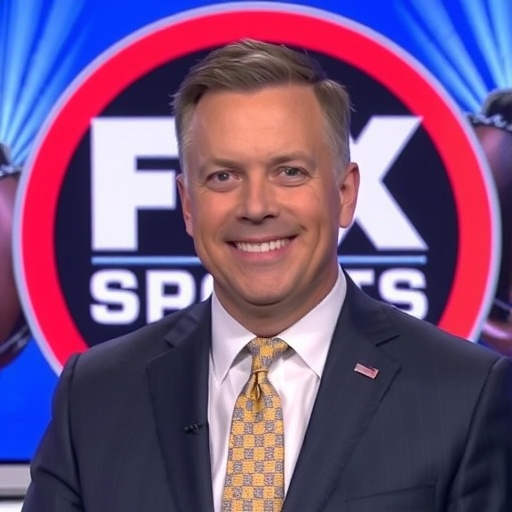Fox Sports CEO Eric Shanks Signals Early NFL Rights Talks: What It Means for Broadcasting Future
In a surprising yet anticipated move that’s sending ripples through the sports media world, Fox Sports CEO Eric Shanks has openly discussed the potential for early negotiations on NFL Rights. Speaking at a recent industry conference, Shanks downplayed the buzz as “not unexpected,” but his comments have ignited speculation about a high-stakes bidding war that could reshape how fans watch America’s most beloved sport. With current deals set to expire after the 2033 season, Fox Sports‘ proactive stance hints at a scramble among broadcasters to secure premium content in an era dominated by streaming giants.
The NFL’s media rights have long been the crown jewel of American television, generating billions in revenue and commanding viewership numbers that dwarf other programming. Last season alone, NFL games averaged over 17 million viewers per broadcast, according to Nielsen data, underscoring why networks like Fox are eager to lock in extensions ahead of schedule. Shanks’ remarks come at a pivotal time, as the league eyes innovative distribution models to maximize profits amid cord-cutting trends.
Shanks Breaks Down the ‘Inevitable’ Push for NFL Rights Renewal
Eric Shanks, the seasoned leader at the helm of Fox Sports, didn’t mince words during his address at the Sports Business Journal’s summit in New York. “The possibility of early talks on NFL Rights isn’t some bolt from the blue—it’s the natural progression in this hyper-competitive landscape,” Shanks stated, emphasizing that Fox Sports has been preparing for such discussions for months. His candor reflects a broader strategy to maintain Fox’s dominant position, which includes airing the Super Bowl in even-numbered years and a suite of high-profile Sunday afternoon games.
Under Shanks’ guidance since 2015, Fox Sports has invested heavily in NFL production, boasting state-of-the-art studios and innovative graphics that enhance viewer engagement. Shanks highlighted the network’s track record, noting that Fox’s NFL broadcasts have consistently ranked among the top-rated programs. For instance, the 2023 NFC Championship game drew 52.5 million viewers, a testament to the partnership’s enduring appeal. But with competitors like Disney’s ESPN and NBCUniversal circling, Shanks implied that waiting until the last minute could prove costly.
Delving deeper, Shanks touched on the financial stakes. The current NFL media rights package, valued at $110 billion over 11 years, distributes games across multiple platforms. Fox Sports pays approximately $2.7 billion annually for its share, a figure that analysts predict could double in the next cycle due to inflation and the NFL’s global expansion. “We’re not just buying airtime; we’re investing in cultural moments,” Shanks remarked, underscoring the emotional and communal value of NFL Sunday rituals for millions of American families.
Fox Sports’ Storied Legacy in NFL Broadcasting Evolution
To understand Eric Shanks‘ confidence, one must look at Fox Sports‘ transformative role in NFL history. Since acquiring the rights to NFC games in 1994 for a then-record $4.4 billion, Fox revolutionized sports telecasts with its bold graphics, celebrity analysts like Terry Bradshaw, and a youthful energy that contrasted with CBS’s more traditional approach. This deal not only saved Fox from financial woes but also elevated the NFL to new heights of popularity.
Fast-forward to today, and Fox Sports continues to innovate. The network’s integration of augmented reality during games and its Tubi streaming platform have broadened access, especially for younger demographics. Statistics from the 2024 season show that Fox’s NFL apps saw a 25% uptick in mobile streams, per App Annie reports, signaling a shift toward digital consumption. Shanks has championed this hybrid model, arguing it future-proofs Fox Sports against the decline in linear TV subscriptions, which dropped 6.5% last year according to Deloitte.
Yet, challenges abound. The rise of Amazon Prime Video, which snagged Thursday Night Football rights for $1 billion annually, has fragmented the audience. Shanks addressed this head-on, saying, “NFL Rights are about more than exclusivity—they’re about creating ecosystems where fans can engage on their terms.” This philosophy has led Fox to partner with tech firms for enhanced data analytics, allowing personalized highlight reels that keep viewers hooked longer.
Historical context also reveals tensions. In 2013, when the NFL extended deals early, it caught some networks off-guard, leading to inflated costs. Shanks, drawing from that era, positioned Fox Sports as a proactive player, ready to negotiate terms that include international rights and esports tie-ins as the league eyes markets in Europe and Asia.
Industry Rivals React to Early NFL Rights Chatter
Eric Shanks‘ comments have elicited varied responses from competitors vying for NFL Rights. Disney CEO Bob Iger, whose ESPN holds the largest package including Monday Night Football, expressed cautious optimism in a recent earnings call. “We’re always in dialogue with the NFL,” Iger said, alluding to ESPN’s $2.6 billion annual commitment and its bundling with Disney+. However, insiders whisper that Disney’s streaming woes—Disney+ lost 1.3 million subscribers last quarter—could weaken its bargaining power.
NBCUniversal, home to Sunday Night Football, views early talks as an opportunity to consolidate. Comcast’s $2.1 billion yearly deal has been a ratings powerhouse, with games averaging 19.8 million viewers. Executive Mike Cavanagh noted, “The NFL is our tentpole; we’ll adapt to whatever timeline they set.” Meanwhile, Paramount Global, facing financial pressures, might bow out of bidding wars, potentially leaving room for newcomers like Netflix, which streamed a Christmas Day game to 23 million households last year.
Analysts from PwC predict that the next NFL Rights cycle could exceed $200 billion, driven by 5G technology and VR experiences. A survey by Sports Business Journal found 68% of executives believe early negotiations will favor incumbents like Fox Sports, citing established relationships. Shanks echoed this, stating, “Loyalty and proven delivery matter in these talks—Fox Sports has both in spades.”
The ripple effects extend to advertisers. Procter & Gamble and Verizon, major NFL sponsors, stand to benefit from stable broadcasting partners. Yet, with ad revenue for sports TV projected to grow 4.2% annually through 2028 (eMarketer), the pressure is on networks to offer integrated ad solutions across linear and digital platforms.
Strategic Shifts: How Early Talks Could Redefine NFL Fan Experience
As Eric Shanks navigates these waters, the focus sharpens on innovation in NFL Rights distribution. Fox Sports is piloting AI-driven commentary and interactive fan polls during games, aiming to boost engagement metrics that already see 40% of viewers interacting via social media, per Twitter analytics. Shanks envisions a future where NFL Rights include gamified elements, like virtual tailgates, to combat declining youth viewership—only 37% of Gen Z watched NFL games in 2023, down from 45% in 2019 (Harris Poll).
Regulatory scrutiny looms as well. The FCC’s push for affordable access could mandate that any new deal includes free-to-air options, challenging pay-TV models. Shanks addressed this, affirming Fox Sports‘ commitment to broad accessibility while protecting premium content value.
Economically, early negotiations could stabilize the industry amid economic uncertainty. The NFL’s $18 billion in annual revenue relies heavily on media deals, which fund player salaries and stadium upgrades. For fans, this means uninterrupted access to stars like Patrick Mahomes, whose games on Fox drew record audiences last season.
Looking ahead, Shanks hinted at collaborative approaches. “Fox Sports is open to joint ventures that expand the pie for everyone,” he said, potentially involving leagues like the NBA in cross-promotions. As talks progress, the outcome will dictate not just broadcasting schedules but the very fabric of sports entertainment.
With the NFL’s international series gaining traction—over 100,000 fans attended the 2024 London games—Eric Shanks sees global potential in NFL Rights. Fox’s expansion into markets like Mexico via Fox Sports Mexico positions it advantageously. Analysts forecast that international rights could add $5 billion to the next package, a windfall that early movers like Fox are poised to capture.
In the coming months, expect more leaks and leaks from league insiders. The NFL, under Commissioner Roger Goodell, has a history of playing its cards close, but Shanks’ transparency suggests the commissioner’s office is receptive to preemptive deals. For Fox Sports, this is more than business—it’s about preserving the thrill of game day for generations.
The implications extend to content creators and podcasters, who thrive on NFL highlights. Platforms like YouTube saw 2.5 billion NFL-related views last year, and secured rights could open doors for official syndication. Shanks’ vision includes empowering these ecosystems, ensuring Fox Sports remains at the intersection of traditional and new media.
Ultimately, as negotiations unfold, the sports world watches closely. Will Eric Shanks secure a landmark extension for Fox Sports? The answer could redefine how we cheer, argue, and unite over football, setting the stage for a more connected, immersive era of NFL Rights.








